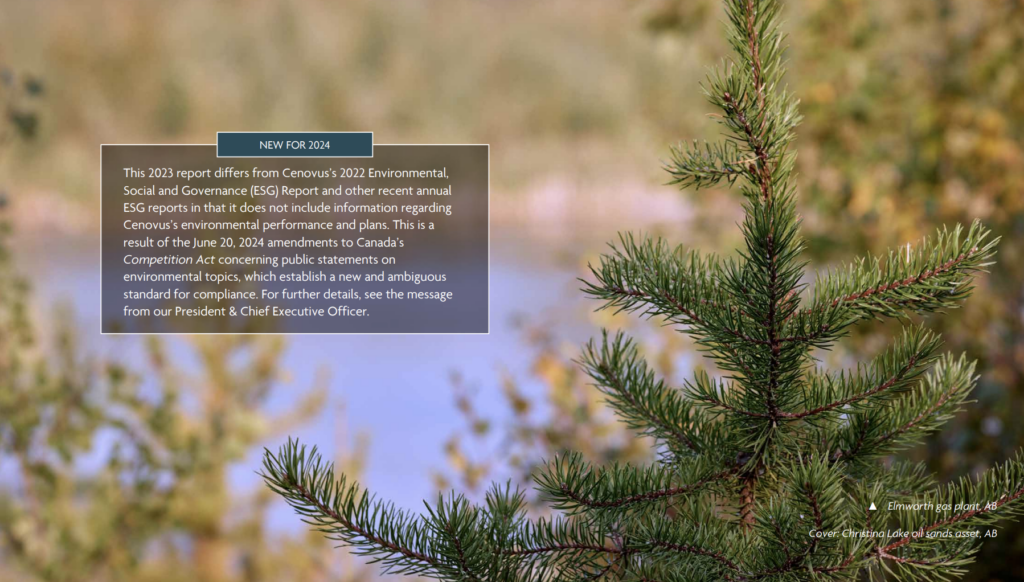“The truth will set you free, but first it will piss you off.” These words were coined to help individuals overcome alcoholism and other addictions, but they may be just as apt to describe the hyperbolic reaction to new truth-in-advertising requirements recently passed into law by the Canadian government from the oil patch and their surrogates.
Subscribe to our newsletter
Stay up to date with DeSmog news and alerts
The Financial Post declared Bill C-59 should be renamed the “oil & gas company cancellation act.” Alberta Premier Danielle Smith described the new requirements for companies to back up their green claims with evidence as “draconian legislation that will irreparably harm Canadians’ ability to hear the truth about the energy industry and Alberta’s successes in reducing global emissions.” Calling the new federal law “absurd authoritarian censorship,” Smith further opined that it was “part of an agenda to create chaos and uncertainty for energy investors for the purpose of phasing out the energy industry altogether.”
Several oil sands companies including Cenovus and Canadian Natural Resources (CNRL) even delayed their environmental, social, and governance (ESG) reporting to investors, blaming the uncertainty associated with the new law. CNRL stated in their second quarter report to investors, “…the Canadian Government amended the Competition Act and due to uncertainty on how this new legislation will be interpreted and applied, we are unable to provide an environment and climate update at this time.”

However, there is nothing whatsoever in Bill C-59 that singles out the fossil fuel sector. Are other publicly traded companies delaying their ESG reporting?
More Transparency Coming
Canadian National Railway seemed to have no problem publishing their 2023 sustainability report in July of this year. Brookfield Corporation released their ESG report in June, as did Canadian Tire. Most of these Canadian companies have market capitalizations exceeding oil sands operators like Suncor, Cenovus and Canadian Natural Resources.
Rather than getting mad at the federal government for requiring companies to tell the truth on climate claims, industry might instead be grateful that domestic regulators are preparing publicly traded companies for the rapidly evolving international requirements on sustainability reporting.
Efforts like the Task Force on Climate-related Financial Disclosures (TCFD) in the UK, the Corporate Sustainability Reporting Directive (CSRD) in Europe, and California’s climate disclosure rules mean that companies will have to disclose credible climate plans and risks as early as 2025 to be compliant with emerging financial reporting regulations around the world. Canadian security regulators are already in the process of updating reporting requirements to be consistent with the recently formed International Sustainability Standards Board (ISSB), which is drafting new global standards for environmental accounting.
Are Canadian businesses ready for this new regime of climate transparency? A recent review of over 250 companies by PricewaterhouseCoopers found that “38 percent of the companies in our analysis don’t mention TCFD or only include a limited narrative around its four pillars. A similar number of companies (31 percent) don’t include a discussion of their material issues.”
The authors of the PWC report also found that “81 percent of companies don’t financially quantify climate-related risks in their reporting” — even though the new ISSB standards include a specific requirement for companies “to disclose quantitative information on how sustainability-related risks and opportunities affect their current and future financial position and performance.”
The rapid move towards consistent climate reporting requirements is being driven by an urgent need among global investors to standardize how climate related risks are itemized by companies seeking capital. Already the newly minted ISSB standards have been adopted by more than 20 jurisdictions, representing 55 percent of global GDP and more than half of GHG emissions.
The chair of the Canadian Sustainability Standards Board Charles-Antoine St-Jean told Desmog in August that compared to typical timelines for developing new financial reporting standards, this process was being done at “warp speed” – driven by the urgency of the climate crisis.
Threatened by Truth
And for all the performative outrage from the oil patch about C-59, we should not forget that Canadian companies are already legally required to be truthful in their financial disclosures and ESG reporting under existing security reporting standards. And while the new reporting standards being developed by the CSSB will initially be voluntary there is an expectation that they will soon be deemed mandatory by the Canadian Securities Administrators.
Whether the oil patch likes it or not, a powerful global momentum is building to legally require companies to be prescriptively transparent with their investors around climate-related liabilities. How frightened is the oil lobby of this coming change?
An indication is seen in the flurry of public comments to proposed arcane accounting standards from oil-funded surrogates of climate denial such as the Friends of Science and International Climate Science Coalition. Apparently recognizing the dangers posed to the Alberta oil patch by more rigorous financial reporting standards, their submissions called for the draft standards to be gutted by ignoring tailpipe (scope 3) emissions, or simply denying they were needed because “no evidence supports the claim that we are in a climate emergency…”
Back in Alberta, Premier Smith fumes that her government will stem this international tide using constitutional court challenges against bill C-59. Performative litigation and other such tactics have been used for years to frame any new burden on oil companies as an Ottawa power grab, but will do little to restrain the tectonic shifts already underway regarding disclosures of financial climate risks.
Will accountants save the world? It remains to be seen if efforts like the CSSB will stick to principles of transparent financial disclosure or cave into those companies seeking to delay or water down climate reporting to investors, particularly around scope 3 emissions. The CSSB are currently reviewing over 600 pages of public comments. Regardless of the outcome, it has become clear that a key battleground for the future of our climate is how truthful companies are legally required to be in their public pronouncements and their balance sheets.
According to St-Jean, “it’s a consequential issue, and that’s the reason why we’re taking the time needed to review from all the angles. The white smoke on our decisions will be coming out sometime this fall.” Interestingly, St-Jean unexpectedly left the CSSB board in late August. Stay tuned for further developments on this important issue.
Subscribe to our newsletter
Stay up to date with DeSmog news and alerts






